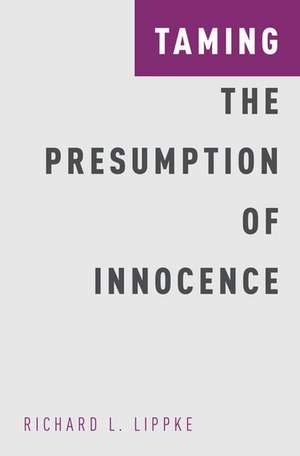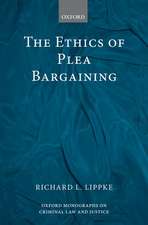Taming the Presumption of Innocence: Studies in Penal Theory and Philosophy
Autor Richard L. Lippkeen Limba Engleză Hardback – 17 mar 2016
Din seria Studies in Penal Theory and Philosophy
- 30%
 Preț: 657.70 lei
Preț: 657.70 lei - 25%
 Preț: 586.75 lei
Preț: 586.75 lei - 23%
 Preț: 803.59 lei
Preț: 803.59 lei - 13%
 Preț: 617.12 lei
Preț: 617.12 lei - 9%
 Preț: 481.86 lei
Preț: 481.86 lei - 13%
 Preț: 558.17 lei
Preț: 558.17 lei - 27%
 Preț: 429.10 lei
Preț: 429.10 lei - 28%
 Preț: 461.60 lei
Preț: 461.60 lei - 28%
 Preț: 491.01 lei
Preț: 491.01 lei - 28%
 Preț: 492.28 lei
Preț: 492.28 lei - 28%
 Preț: 461.18 lei
Preț: 461.18 lei - 19%
 Preț: 271.02 lei
Preț: 271.02 lei - 23%
 Preț: 449.85 lei
Preț: 449.85 lei - 28%
 Preț: 491.84 lei
Preț: 491.84 lei - 27%
 Preț: 378.02 lei
Preț: 378.02 lei
Preț: 759.58 lei
Preț vechi: 1091.98 lei
-30% Nou
Puncte Express: 1139
Preț estimativ în valută:
145.34€ • 152.16$ • 120.26£
145.34€ • 152.16$ • 120.26£
Carte tipărită la comandă
Livrare economică 26 martie-01 aprilie
Preluare comenzi: 021 569.72.76
Specificații
ISBN-13: 9780190469191
ISBN-10: 0190469196
Pagini: 288
Dimensiuni: 160 x 239 x 31 mm
Greutate: 0.54 kg
Editura: Oxford University Press
Colecția OUP USA
Seria Studies in Penal Theory and Philosophy
Locul publicării:New York, United States
ISBN-10: 0190469196
Pagini: 288
Dimensiuni: 160 x 239 x 31 mm
Greutate: 0.54 kg
Editura: Oxford University Press
Colecția OUP USA
Seria Studies in Penal Theory and Philosophy
Locul publicării:New York, United States
Recenzii
"engaging and thoughtful ... The book's careful analysis will make it of interest to a wide range of readers thinking about the legitimacy and improvement of the criminal justice system.
Taming the Presumption of Innocence is a milestone. It appears, astonishingly, to be the only contemporary book-length treatment of the presumption of innocence by a U.S. author. Its scope is vast: Richard Lippke aspires to cut through a wilderness of theoretical and legal confusion about the presumption of innocence, propose a focused vision of the presumption, and defend that vision against objections.
The presumption of innocence is a central, but relatively under-explored, tenet of the criminal law. Richard L. Lippke's welcome analysis of the philosophical issues it raises is penetrating and provocative. In a wide-ranging exploration, this book examines the nature of the presumption, what it means to talk of innocence, upon whom the burden of the presumption falls, and what it requires. Lippke offers a stimulating critique of the existing literature and a persuasive challenge to the overly extensive claims made for the presumption of innocence. Tackling a presumption at the very heart of the criminal justice system, this brilliant exemplar of applied philosophy will be of great interest to academics and practitioners alike.
Lippke's book offers a clear and multi-dimensional analysis of a concept that is universally recognized but whose content is widely misunderstood, even by prominent judges and lawyers. It is indisputably the definitive effort to date to lay bare the multiple meanings - and numerous confusions - associated with the presumption of innocence.
Richard L. Lippke's Taming the Presumption of Innocence is a major contribution to our theoretical understanding of criminal procedure. Founding his argument in the basic rights of life, liberty, and equality, Lippke advances a strong case for confining the presumption to the trial process. A thorough scrutiny of the presumption of innocence, this book argues that some of the work that the presumption has been said to do outside the trial, such as treating criminal suspects with respect and dignity, should be accomplished with legal principles directly aimed at those goals.
Taming the Presumption of Innocence is a milestone. It appears, astonishingly, to be the only contemporary book-length treatment of the presumption of innocence by a U.S. author. Its scope is vast: Richard Lippke aspires to cut through a wilderness of theoretical and legal confusion about the presumption of innocence, propose a focused vision of the presumption, and defend that vision against objections.
The presumption of innocence is a central, but relatively under-explored, tenet of the criminal law. Richard L. Lippke's welcome analysis of the philosophical issues it raises is penetrating and provocative. In a wide-ranging exploration, this book examines the nature of the presumption, what it means to talk of innocence, upon whom the burden of the presumption falls, and what it requires. Lippke offers a stimulating critique of the existing literature and a persuasive challenge to the overly extensive claims made for the presumption of innocence. Tackling a presumption at the very heart of the criminal justice system, this brilliant exemplar of applied philosophy will be of great interest to academics and practitioners alike.
Lippke's book offers a clear and multi-dimensional analysis of a concept that is universally recognized but whose content is widely misunderstood, even by prominent judges and lawyers. It is indisputably the definitive effort to date to lay bare the multiple meanings - and numerous confusions - associated with the presumption of innocence.
Richard L. Lippke's Taming the Presumption of Innocence is a major contribution to our theoretical understanding of criminal procedure. Founding his argument in the basic rights of life, liberty, and equality, Lippke advances a strong case for confining the presumption to the trial process. A thorough scrutiny of the presumption of innocence, this book argues that some of the work that the presumption has been said to do outside the trial, such as treating criminal suspects with respect and dignity, should be accomplished with legal principles directly aimed at those goals.
Notă biografică
Richard L. Lippke is Professor in the Department of Criminal Justice at Indiana University, Bloomington










